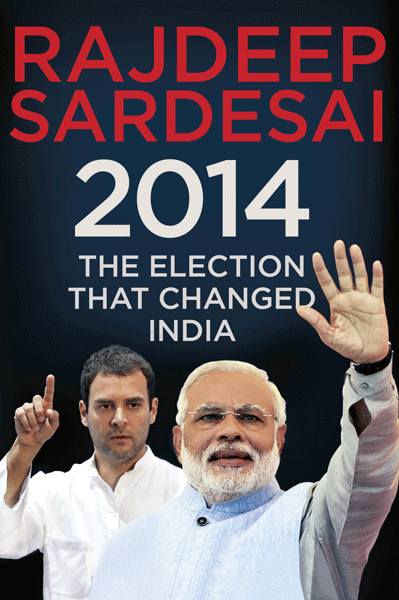
Indians, like people in all good democracies, dislike their politicians. Yet, paradoxically, they love politics very much. So they are willing to read any number of books about it. The more salacious the gossip and the inner stories in such books, the more they sell.
In the last nine months there have been two hugely successful such books. The first was Sanjaya Baru’s The Accidental Prime Minister. He had been the media advisor to Prime Minister Manmohan Singh from 2004 to 2008 which were the UPA I’s glory years.
The second is Rajdeep Sardesai’s 2014: The Election that Changed India. In contrast to Baru’s book it is mostly about the UPA II’s debacle years from 2010–14. He tells the story well, though not with great insight or wisdom because those have perhaps been exhausted in the interminable debates on TV. But there are lots of anecdotes, including one about how in the 1990s Narendra Modi would go the extra mile to be on national television.
As one of India’s three main television news anchors, Sardesai has had the great advantage of access. Extending over more than a decade, this access gave him more than enough material to produce a longish book, all of 372 pages. Every politician was willing to meet and talk to him. He was able to interview them at will. He could pick up the phone, check things out whenever needed. He seems to have dined with all of them, sometimes on winning bets.
His description of his dinner with Mamata Banerjee, who cooked the meal for him, is very evocative: “The sight of the West Bengal Chief Minister in the kitchen, her crumpled sari tied in a no-nonsense knot, sweat pouring from her brow, rushing between steaming pots of Bengali delicacies was, I must confess, more than a little disconcerting.”
Also, he has what it takes to be a good political writer, a feel for the way a politician’s mind works. But, as I have written elsewhere, “an understanding of low cunning is not enough for political writers. It must be complemented by the ability to link into a coherent whole the seemingly disparate dots that emerge during conversations with politicians and the bureaucrats.”
Sardesai has managed to do this with great finesse. The result is as accurate an account of contemporary history as one is likely to get. That he should have produced such book within just a few months — between May and October 2014 — is also highly commendable, and indicates his capacity for real hard work.
The book is intended largely to explain the political processes and shifts which Narendra Modi’s rise to power — and the decline of the Congress — ushered in. Sardesai begins with the tremendous organising abilities of Modi which first came to be noticed when L K Advani was on his Rath Yatra in 1989 to reclaim Babri Masjid for the Hindus. Modi, says Sardesai, understood the power of the media even then and kept journalists happy. It was only later, after he had become Chief Minister of Gujarat and the riots had happened that he slowly turned against traditional media.
The author’s coverage of the riots and its aftermath for NDTV where he worked at the time was one of Modi’s pet peeves. During the 2014 election campaign Modi refused to give Sardesai an interview. It wasn’t always like that. In the 1990s when Modi was living in Delhi — as an exile he would say from Gujarat politics — Sardesai and he struck up a good professional relationship over kadhi-chawal.
Sardesai, by the way, largely exonerates Modi of direct responsibility in the riots. He says as a rookie CM he could only stand by and watch as the likes of Praveen Togadia of the Vishva Hindu Parishad (VHP) called all the shots.
In conclusion, I cannot resist pointing out that I was one of the first journalists, (as far as back as 2006 in fact) to say in an article that Modi could become Prime Minister one day. Sardesai — and the other breathless TV-wallahs — missed the deeper undercurrents of Indian politics then. In this book, he misses them again.





